
Digital marketing is hot, red hot, liquid hot, magma hot. The total yearly spend for this field according to a recent Forrester report is predicted to be $146 billion by 2023, with no end in sight. SEO, or Search Engine Optimization, is a major key discipline and driver of all of this commerce, as evidenced by the 43% increase year over year in jobs that it generated for 2018 alone (SEJ sourced here). With all of this money floating around, there are a lot of hands in the proverbial cookie jar, and SEOs today are faced with a highly competitive and evolving market.
So, what tools should SEOs use to improve their workflow and process? Are they missing out because they’ve chosen Moz instead of Ahrefs? Does the competition have some sort of unknown edge? Professional SEOs are faced with an overwhelming number of options, both paid and free. What are they to do?
The truth is hard for some to face, but it is a reality for any profession: the tool is only as good as the hands that wield it. Give a golf newcomer a $3,000 driver instead of a starter club and they’re still going to slice that ball into the parked Tesla. Most paid for tools only offer some assistance towards producing effective SEO work; the knowledge and experience of the professional using them is what unlocks their true potential. If we want to truly understand modern SEO, then utilizing these three free tools in conjunction is the way.
#1) Google’s SERP
Yep, you don’t even have to download anything. The SERP, or Search Engine Results Page, for Google provides an immense amount of the most relevant information you can find. In fact, the bread and butter of most paid SEO tools is simply a fancy SERP data scraper. They save time, but you don’t get the full experience of a search from them, and the data is often hours if not days old. Why is this important? The buzzword of the day: search intent.
Google has one very simple mission when it comes to organic traffic: provide the searcher with what they’re looking for, ASAP. Every searcher is a customer in Google’s eyes and like any good business, they want to serve their customers as fast as they can. If your landing page doesn’t cover your chosen topic, you will see two things happen as a result: first, minimal traffic and second angry client emails. This is search intent in a nutshell, a simple concept yet also seemingly difficult for many to satisfy.
So, how do you actually determine search intent for a set of queries, or even figure out the queries and topics to target in the first place? The answer is simple, you start Googling! It’s free, easy, and you’re utilizing a terrifying billion dollar self-learning AI that the Terminator franchise has been warning us about since 1984. Here’s an example:
Say we have a client that has a sizable number of 2020 and 2019 Ford Explorers in their inventory and they want to start getting traffic from searchers who are looking into this model. What do we do? Well, besides optimizing their pre-existing pages, one of the best ways to achieve this goal is content marketing, and to do content marketing properly we need ideas. Go ahead and fire up Chrome and switch to Incognito mode. Then, Google the term “Ford Explorer”, what do you get?
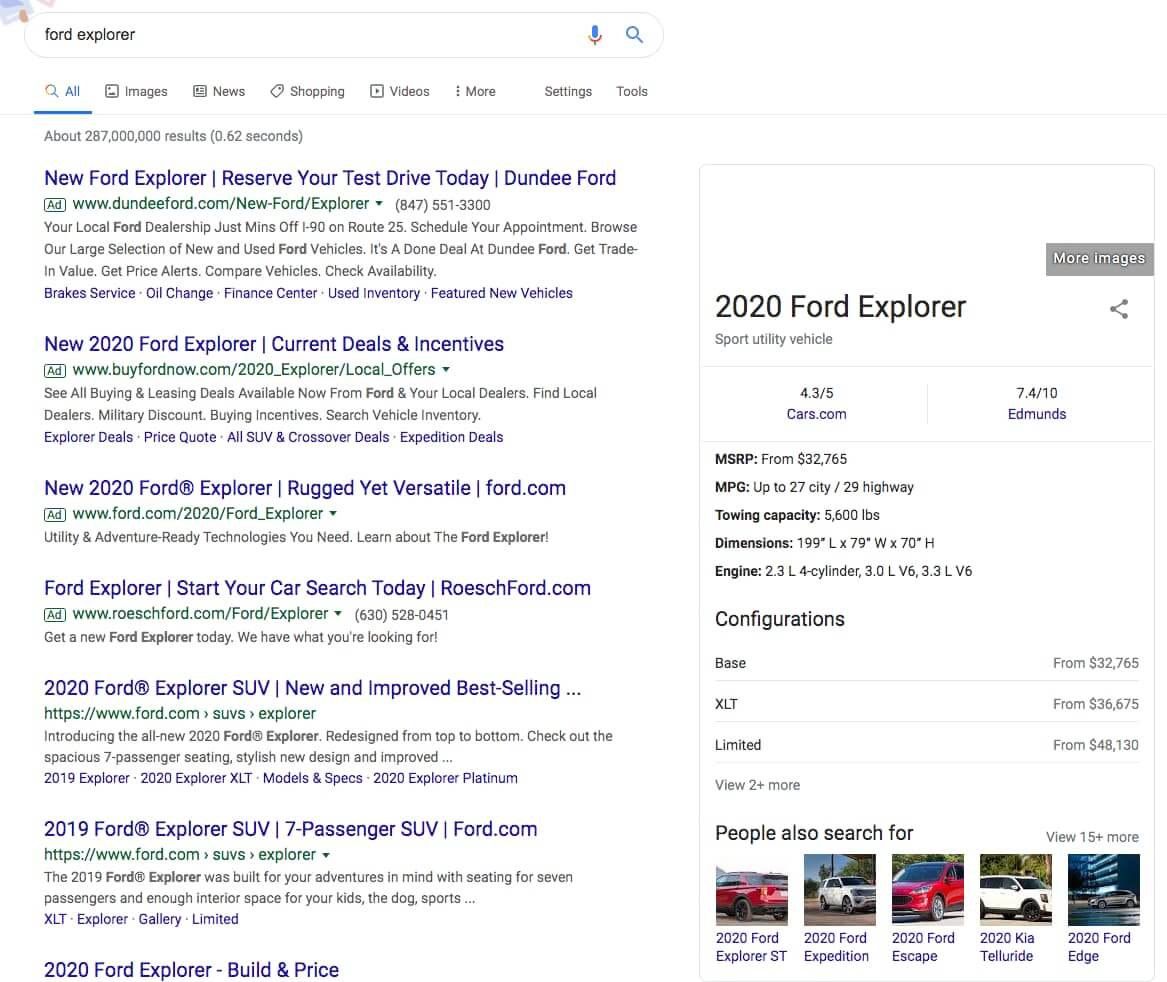
- A bunch of PPC ads that suspiciously look like organic results.
- A knowledge panel containing a bunch of information about the model and its competition. #3) Organic results for ford.com for both the 2020 & 2019.
- The Ford Explorer Wikipedia page sandwiched between CarMax & Cars.com listings.
- More PPC ads
From this SERP, we are presented with an immense amount of information for how Google views this particular search term for desktop users. We know from the number of PPC ads that “ford explorer” has loads of commercial intent behind it, and we know given the Wikipedia page and the knowledge panel being present in the SERP that there is some informational intent here as well. This is referred to as a mixed intent SERP, and it is very common for product searches.
We know from experience that “ford explorer” will be a very difficult keyword to rank for, given that our competitors would be ford.com, PPC ads, and some powerhouse players in the automotive industry. If you’re pretty new to SEO or the vertical you’re working with I would recommend that you utilize a free Chrome extension, such as Mozbar, to assist you in your analysis. With tools such as Mozbar you can quickly obtain information in regards to how difficult it may be to rank for any particular keyword, rather than playing a guessing game.
The uninitiated would believe that we have gotten nothing out of this little experiment, but I say we dig a little deeper. We can tell from looking at the knowledge panel on the right that the configurations or “trims” for this model are a popular sub-topic, otherwise they wouldn’t be there. We also know that the Escape, Expedition, and Edge are popular intra-brand comparisons, and that the 2020 Kia Telluride is a direct competitor. Let’s take this information incorporate our next free tool.
#2) Soovle.com
Soovwhat? Soovle (https://soovle.com/) is a popular free tool that instantly shows you the autocomplete for any query for multiple search engines. See examples below:
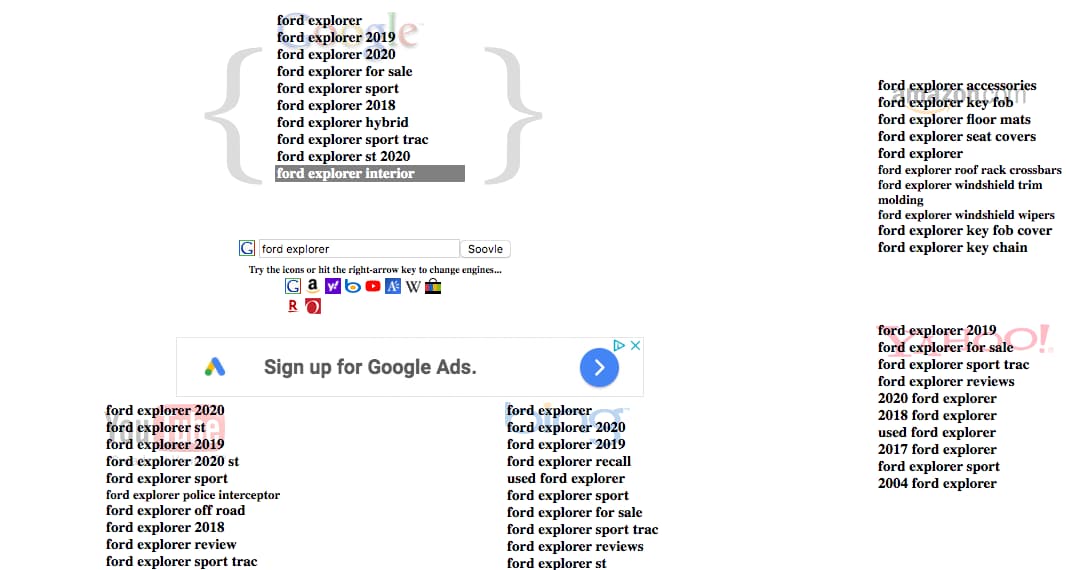
You can be assured there is significant volume for the above autocomplete terms, but again I would recommend utilizing a Chrome extension that will assist you, such as Keyword Surfer.
As we look at the initial results, we can already see some sub-topic ideas that we perhaps haven’t thought of before, but let me show you a neat trick to give you even more ideas. Take your seed keyword of “Ford Explorer” and add a letter to it, in this case lets use “v”:
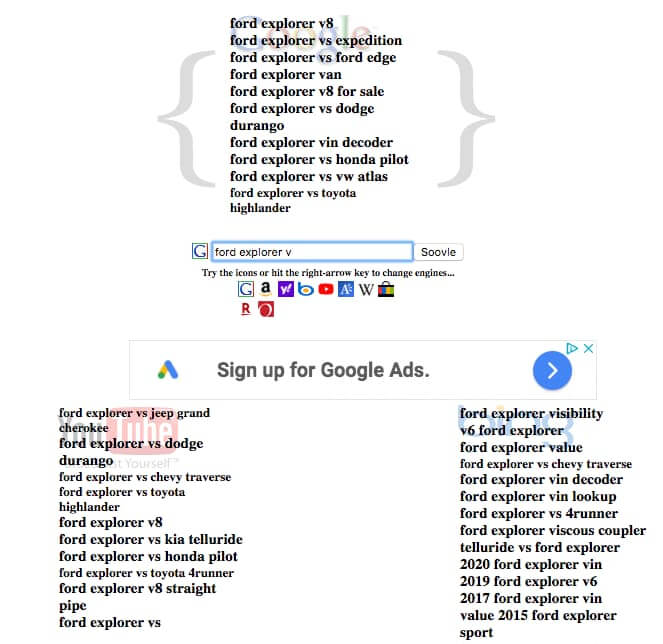
Now, we see why Google was showing those models in the knowledge panel; people are actually searching for these comparisons. If you’re a dealership selling this model, it wouldn’t be a bad idea at all to serve this search intent by having a similar page created for your own business, perhaps even have a PPC campaign land potential customers on it. However, to organically rank for search terms such as “ford explorer vs expedition” you must create a page better than what currently exists on the SERP. That means actually researching the topic, looking at what your competition did, and then finally creating your own version that is ten-times better. There are no shortcuts to success here.
#3) GS Location Changer
If you’ve worked in the SEO space for any period of time, you’ll know that local SEO is a major aspect of digital marketing, and it is now more important than ever. We must consider the actual practical value of our strategies to our clients, rather than simply creating pages that generate traffic. Often, we see other agencies produce pages such as “How to Remote Start Your Honda Civic” just so they can later show their client an upward trend in traffic, with little care as to whether the page actually provides any real business value at all. Our client has to see a return on investment (ROI) at some point, otherwise they will find someone else. We need to find queries that actually matter to the business and are locally relevant, and GS Location Changer can really help in this regard.
What GS Location Changer does is simple. It emulates a search from any given location. You just have to supply the city. Do note that not all searches will have much “locality” applied to them; it depends on Google determining that your current location to the search term matters for user experience. For example, searching “spinosaurus vs velociraptor” won’t have any locality applied to it because it’s informational. But, if you search for something with a bit of commercial value like say “Ford dealership,” you’re going to get a lot of variations depending on where you’re at in the world:
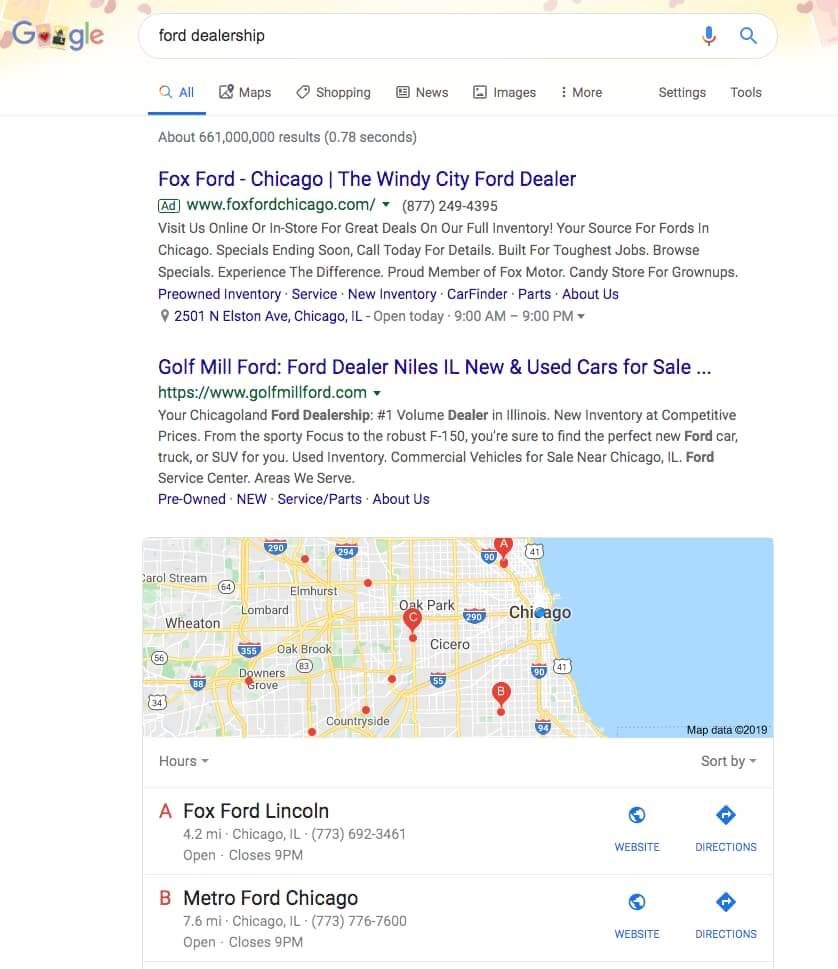
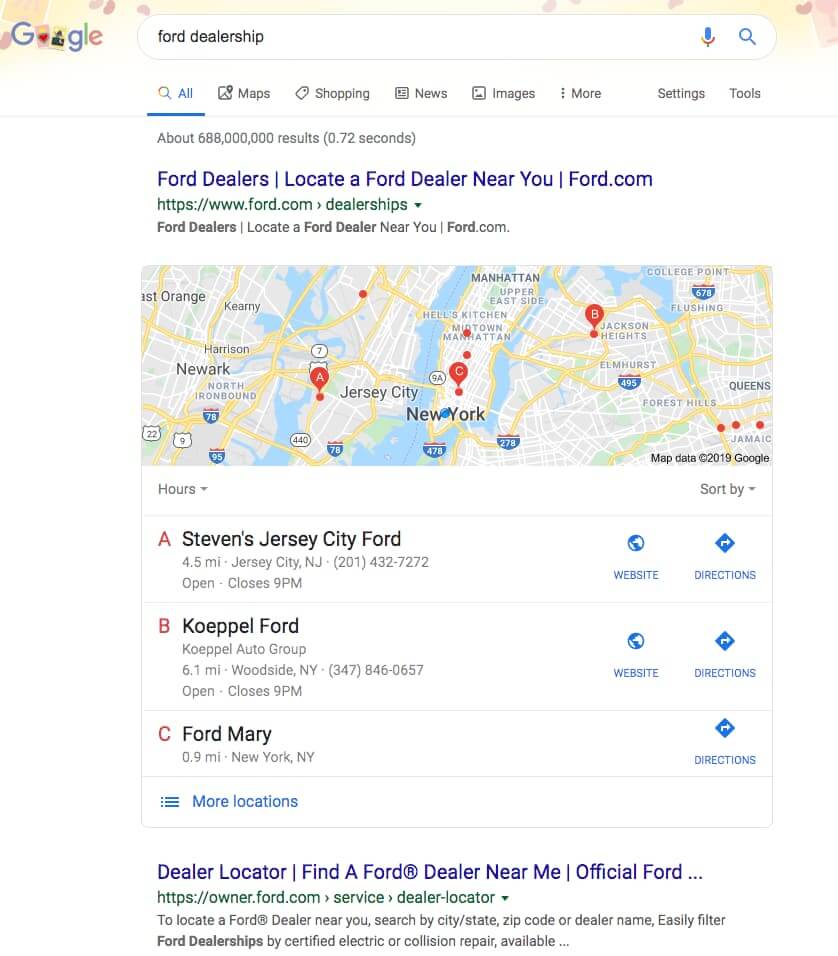
I recommend a lot of experimentation here, both for terms that your client currently ranks for, as well as terms that their competitors are seeing traffic from. The possibilities are endless and ever changing, yet if done right, this will be one of the most valuable free tools in your arsenal. Don’t forget to do searches within the mobile view as well, as the SERP can be entirely different.
Are you interested in investing your time and money with a digital marketing agency that is focused on executing strategies that actually matter to your business? Give Aronson Advertising a call at (847) 297-1700 or send us a message via our contact form!
